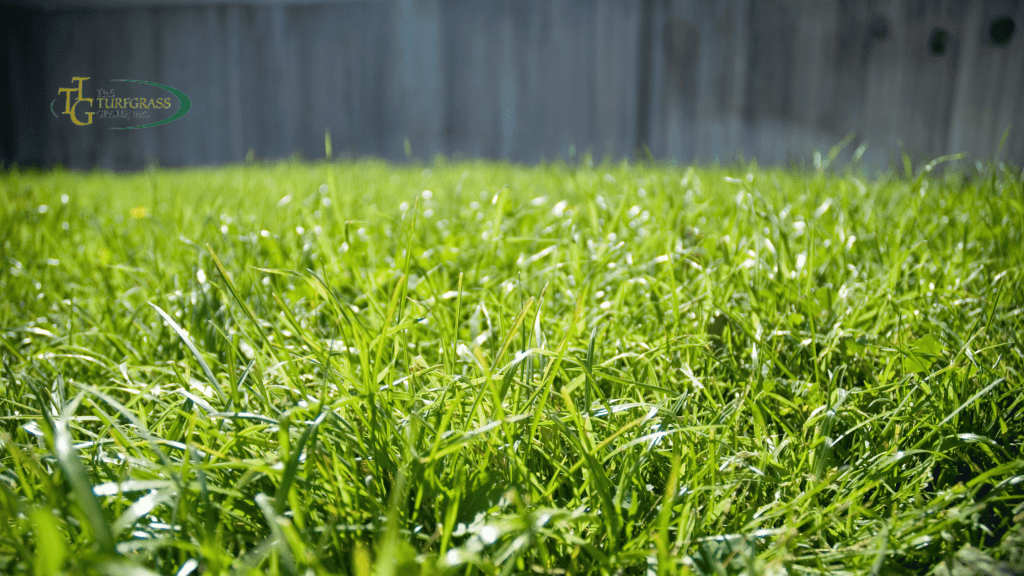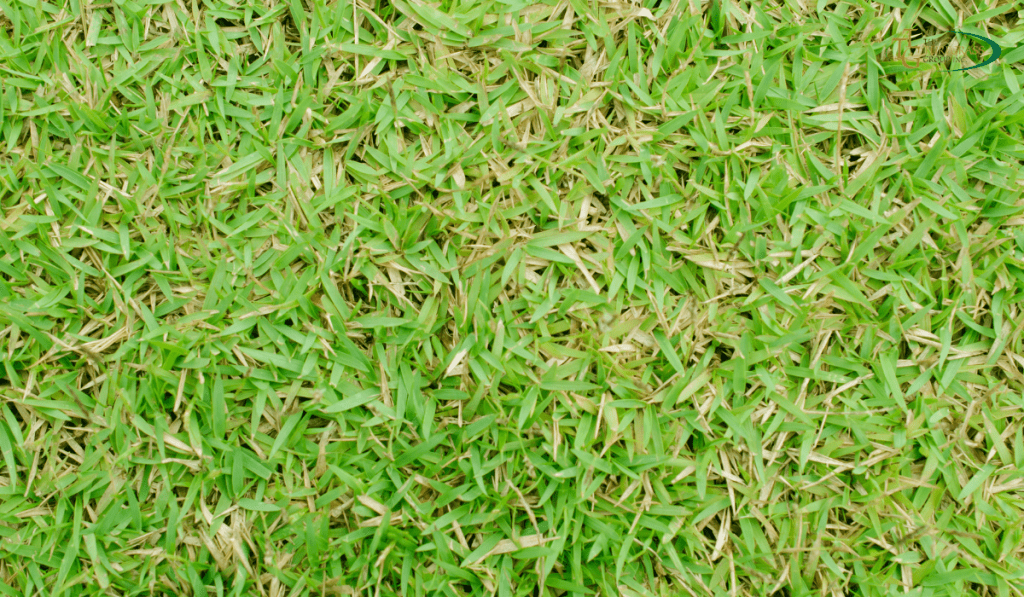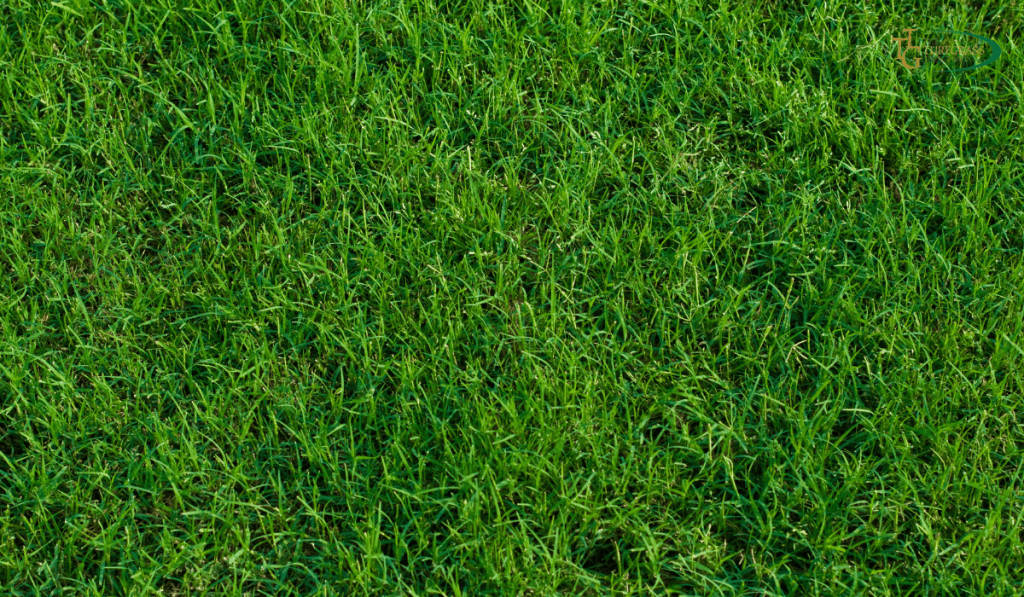
Bermuda grass look (Cynodon dactylon) is a warm-season grass that is commonly used for lawns due to its resilience and vibrant appearance. It has several distinctive features that set it apart:
- Appearance: Bermuda grass has fine-textured blades that are narrow and pointed. The blades can vary in color, ranging from light green to dark green, depending on the specific variety and growing conditions.
- Growth Habit: This grass spreads through above-ground stems called stolons and underground stems called rhizomes. These features allow Bermuda grass to form a dense and thick turf, making it an excellent choice for high-traffic areas.
- Low Growth Height: Bermuda grass typically has a low growth height, ranging from 1 to 3 inches when maintained properly. It creates a well-manicured look and can withstand frequent mowing without significant damage.
- Resilience: Bermuda grass is known for its ability to tolerate heat, drought, and foot traffic. It has a remarkable capacity for recovery, quickly regenerating from damage and filling in bare patches.
To keep your Bermuda grass looking its best, regular lawn care practices are essential. These include proper mowing at the recommended height, regular watering to ensure adequate moisture, fertilization to provide essential nutrients, and proactive weed control measures. By maintaining a consistent care routine, you can enjoy a lush and healthy Bermuda grass lawn that enhances the beauty of your outdoor space.
Understanding The Types Of Bermuda Grass
Bermuda grass (Cynodon dactylon) is a warm-season grass that is popularly used for lawns due to its ability to withstand heat and drought. There are several types of Bermuda grass, including common Bermuda grass, hybrid Bermuda grass, and improved varieties such as Tifway 419 and Celebration. Each type has its own characteristics and is suitable for different applications.
How To Identify Bermuda Grass?

Identifying Bermuda grass can be relatively easy once you know what to look for. Bermuda grass has a distinct appearance with fine-textured blades that are typically dark green in color. The blades are narrow and can be sharp at the tips. The grass forms a dense and low-growing turf, spreading through above-ground runners called stolons and underground stems called rhizomes. Bermuda grass also produces seed heads that resemble spikes with tiny, finger-like branches.
How Bermuda Grass Grows And Spreads?
Bermuda grass is known for its aggressive growth and spreading habit. It thrives in warm climates and full sun, but it can also tolerate some shade. Bermuda grass spreads rapidly through its stolons and rhizomes, quickly filling in bare patches and choking out other grasses and weeds. It has a high growth rate during the summer months and goes dormant in cooler temperatures. With proper care and maintenance, Bermuda grass can form a lush, resilient lawn.
How To Take Care Of Your Bermuda Lawn?
Maintaining a healthy Bermuda lawn requires proper care and maintenance. Here are some essential tips:
- Mowing: Keep Bermuda grass at an optimal height of around 1 to 1.5 inches. Regular mowing helps control weed growth and promotes lateral spreading.
- Watering: Bermuda grass is relatively drought-tolerant, but it still needs regular watering, especially during dry periods. Water deeply and infrequently to encourage deep root growth.
- Fertilizing: Apply a balanced fertilizer for Bermuda Grass with a higher nitrogen content to promote healthy growth. Follow the recommended application rates and timing for best results.
- Weed Control: Bermuda grass is aggressive and can outcompete many weeds. However, regular inspection and spot treatments may be necessary to control persistent weeds.
- Aeration: Core aeration helps alleviate soil compaction and improves nutrient absorption. Perform aeration during the active growing season to benefit your Bermuda lawn.
Pros And Cons Of Bermuda Grass
Bermuda grass offers several advantages and disadvantages that are worth considering:
Pros:
- Drought-tolerant and heat-resistant.
- Recovers quickly from damage and foot traffic.
- Forms a dense turf that chokes out weeds.
- Thrives in full sun and tolerates some shade.
- Suitable for high-traffic areas.
Cons:
- Can become invasive and spread to neighboring areas.
- Requires regular mowing and maintenance.
- May turn brown during winter dormancy in cooler regions.
- Some people may have allergies or skin irritations when in contact with Bermuda grass.
FAQ
What Does Bermuda Grass Look Like When It First Comes Up?
When Bermuda grass first emerges, it appears as small, slender shoots with a pale green color. The blades are tender and delicate, gradually developing their characteristic dark green hue as they mature. The young grass forms a sparse and uneven coverage initially, but with proper care and time, it will fill in and create a lush, vibrant lawn.
How Do I Know If I Have Bermuda Grass?
To determine if you have Bermuda grass, look for the following signs:
- Appearance: Bermuda grass has fine-textured blades that are narrow and sharp at the tips. It forms a dense turf with a dark green color.
- Growth Habit: Bermuda grass spreads aggressively through stolons and rhizomes, creating a thick, carpet-like growth pattern.
- Seed Heads: During the growing season, Bermuda grass produces seed heads that resemble spikes with finger-like branches.
- Resilience to Heat and Drought: Bermuda grass is known for its ability to withstand hot and dry conditions, making it a common choice for lawns in warm climates.
If these characteristics match your grass, it is likely that you have Bermuda grass in your lawn.
Is Crabgrass and Bermuda Grass the Same Thing?
No, crabgrass and Bermuda grass are different species of grass with distinct characteristics. While both can be considered weeds in lawns, they have notable differences:
- Appearance: Bermuda grass has finer blades and forms a dense turf, whereas crabgrass has wider blades and grows in clumps.
- Growth Habit: Bermuda grass spreads through stolons and rhizomes, while crabgrass spreads by producing seeds and growing in patches.
- Seasonality: Bermuda grass is a warm-season grass that thrives in the summer, while crabgrass is an annual grass that germinates in the spring and dies off in the fall.
Though they share the trait of being unwanted in lawns, Bermuda grass and crabgrass require different management strategies for control.
Will Bermuda Grass Take Over My Lawn?

Bermuda grass has a vigorous growth habit and can be invasive if not properly managed. Without regular maintenance, it has the potential to take over a lawn, crowding out other grasses and plants. However, with proactive care, such as regular mowing, adequate watering, and weed control measures, you can keep Bermuda grass in check and maintain a balanced lawn ecosystem.
Does Bermuda Grass Spread on Its Own?
Yes, Bermuda grass spreads naturally through its stolons and rhizomes. These above-ground runners and underground stems allow the grass to extend its reach and form new growth points. As the stolons and rhizomes establish contact with the soil, they produce new shoots, enabling Bermuda grass to spread and fill in bare areas over time. This natural spreading characteristic contributes to the ability of Bermuda grass to create a thick and even turf.
Does Bermuda Grass Look Like Weeds?
While Bermuda grass itself is not considered a weed, it can sometimes be mistaken for weeds due to its aggressive growth and appearance. When Bermuda grass is not intentionally planted or maintained, and it starts to encroach on flower beds or other areas where it is not desired, it can be perceived as a weed. However, when properly managed and cared for within a lawn setting, Bermuda grass showcases its desirable qualities as a turf grass.
Does Bermuda Grass Push Out Weeds?
Bermuda grass has the ability to outcompete many weeds due to its aggressive growth and dense turf-forming habit. As it spreads and fills in bare areas, Bermuda grass can effectively crowd out weed species, preventing their establishment and growth. However, it is important to note that some resilient and persistent weeds may still find ways to thrive within a Bermuda lawn. Regular inspection, weed control measures, such as manual removal or targeted herbicide applications, may be necessary to maintain a weed-free Bermuda grass lawn.
How Do I Get Rid of Bermuda Grass in My Lawn?
If you want to remove Bermuda grass from your lawn, there are several methods you can consider:
- Hand Removal: Digging out Bermuda grass by hand can be labor-intensive but effective for small patches. Ensure you remove the entire root system to prevent regrowth.
- Smothering: Covering Bermuda grass with layers of cardboard or thick mulch can smother it over time. This method deprives the grass of sunlight and prevents it from photosynthesizing.
- Herbicides: Selective herbicides designed specifically for Bermuda grass can be applied to target and kill the grass while sparing desirable lawn species. Follow the product instructions carefully for safe and effective use.
- Solarization: In hot summer months, you can cover Bermuda grass with clear plastic to intensify sunlight and heat, effectively killing the grass. This method requires several weeks of coverage to be successful.
- Professional Assistance: If the Bermuda grass infestation is extensive or persistent, consulting with a lawn care professional can provide you with specialized knowledge and expertise to address the issue effectively.
Will Bermuda Grass Grow on Top of Dirt?
Bermuda grass can grow on top of bare dirt if the soil conditions are suitable. It has the ability to establish roots in various types of soil, including sandy or clayey soils. However, for optimal growth and health, Bermuda grass thrives when planted on well-prepared soil with good drainage. Proper soil preparation, such as loosening the soil and adding organic matter, can promote healthy root development and contribute to the establishment of a lush Bermuda grass lawn.
What Is Special About Bermuda Grass?
Bermuda grass possesses several characteristics that make it a popular choice for lawns:
- Drought and Heat Tolerance: Bermuda grass is highly adaptable to hot and dry conditions. It has the ability to withstand extended periods of heat and limited water availability, making it an ideal choice for regions with warm climates.
- Resilience and Fast Recovery: Bermuda grass has a remarkable ability to recover from damage, whether it’s caused by foot traffic, pets, or environmental stressors. It quickly regenerates and fills in bare patches, maintaining a dense and uniform lawn.
- Aggressive Growth and Spreading: The aggressive growth habit of Bermuda grass allows it to spread rapidly through stolons and rhizomes. This enables it to create a thick turf that outcompetes weeds and establishes a visually appealing lawn.
- Versatility: Bermuda grass can tolerate different soil types and has good salt tolerance, making it suitable for a range of environments, including coastal areas.
Does Bermuda Grass Need a Lot of Water?
While Bermuda grass is relatively drought-tolerant, it still requires regular watering, especially during periods of prolonged heat or drought. Adequate irrigation is crucial for maintaining a healthy and vibrant Bermuda lawn. Deep, infrequent watering encourages the development of deep root systems, making the grass more resilient to dry conditions. However, it’s important to strike a balance and avoid overwatering, as excessive moisture can lead to shallow root growth and potential issues such as fungal diseases.
What Is the 1/3 Rule for Bermuda Grass?
The 1/3 rule for Bermuda grass refers to the recommended mowing practice of never removing more than one-third of the grass blade height in a single mowing session. This rule helps maintain the health and vigor of Bermuda grass. By adhering to the 1/3 rule, you prevent stressing the grass and ensure that it can recover quickly from the mowing process. Regular mowing at the appropriate height promotes lateral spreading and a denser turf, contributing to the overall beauty and health of your Bermuda grass lawn.
What Grass Chokes Out Bermuda Grass?
There are a few grass species that are known to have competitive growth and can potentially choke out Bermuda grass:
- Tall Fescue: Tall fescue is a cool-season grass that has a dense growth habit and shade tolerance. It can outcompete Bermuda grass in areas with partial shade and cooler temperatures.
- Zoysia Grass: Zoysia grass is another warm-season grass that has a slow growth rate and forms a dense turf. In certain conditions, such as areas with poor soil drainage, Zoysia grass can outcompete Bermuda grass.
- St. Augustine Grass: St. Augustine grass is a warm-season grass known for its vigorous growth and ability to spread quickly. In some cases, it can overtake Bermuda grass and become the dominant grass species.
It’s important to note that the competitiveness of these grass species may vary depending on the specific growing conditions, maintenance practices, and regional factors.
What Happens If You Let Bermuda Grass Grow?
If you let Bermuda grass grow without regular maintenance, it can have both positive and negative consequences:
Positive Effects:
- Lush Appearance: Bermuda grass can develop a thick and dense turf, resulting in a visually appealing lawn.
- Enhanced Soil Stability: The extensive root system helps improve soil stability by preventing erosion.
Negative Effects:
- Overgrowth: Bermuda grass has a rapid growth rate, and if left uncontrolled, it can spread into flower beds, gardens, and other areas where it is not desired.
- Competition with Other Plants: Bermuda grass can outcompete other plants and grass species, reducing biodiversity and limiting the growth of desired plants.
- Increased Maintenance Requirements: Allowing Bermuda grass to grow unchecked can result in increased maintenance needs, such as more frequent mowing and potential weed control issues.
To maintain a healthy and well-manicured Bermuda grass lawn, regular mowing, watering, fertilizing, and weed control practices should be implemented.